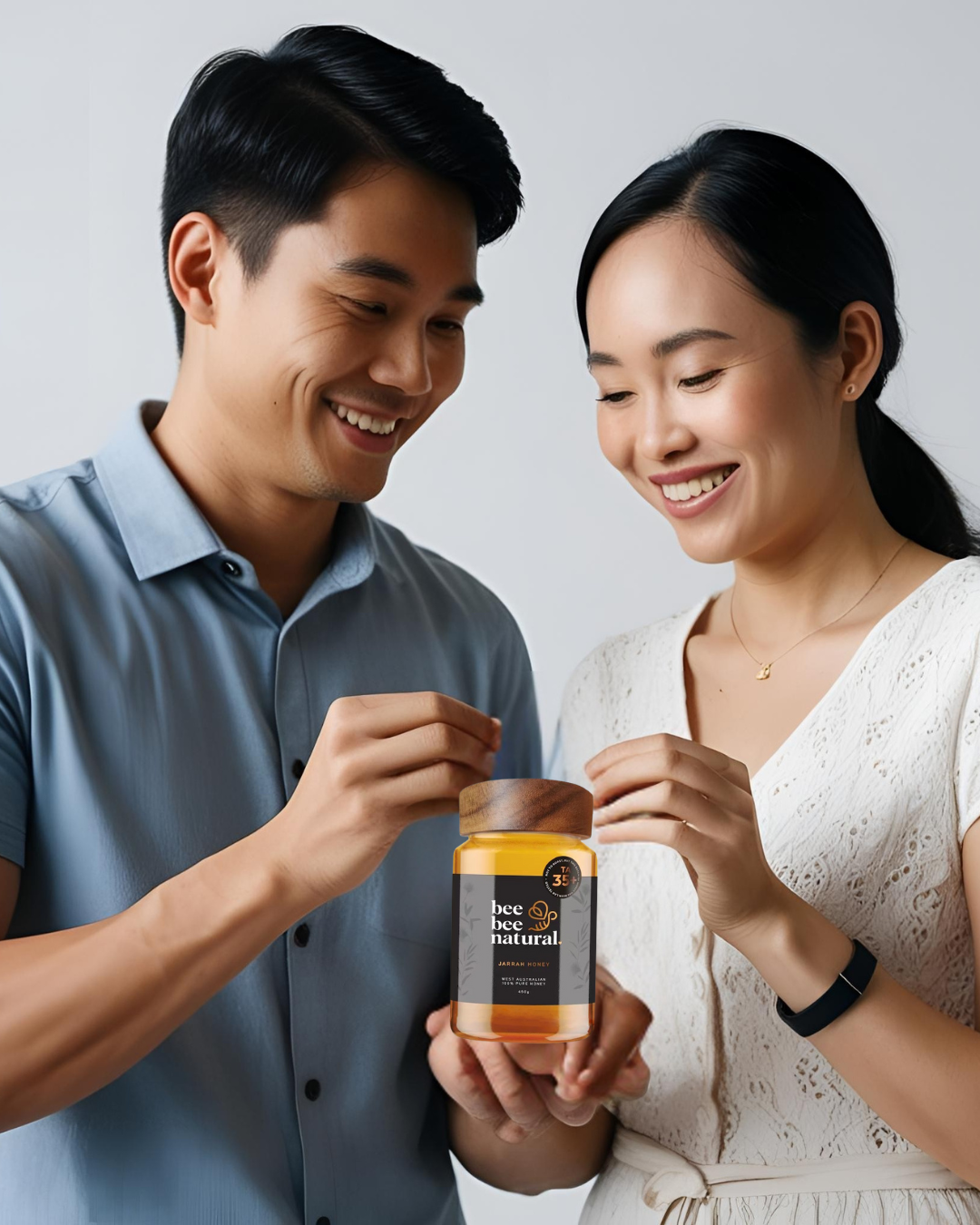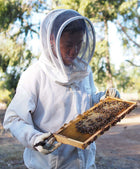Bee Bee Natural: Singapore’s Best Premium Honey to Fight Stomach Ulcers Naturally

Chris’s Journey: From Backyard Beekeeper to Bee Bee Natural Founder
Chris’s passion for bees began when he moved from Singapore to Australia. Back home he was a casual honey lover, but in his Perth suburb he became a hands-on beekeeper. Starting with two hives, he quickly learned the importance of healthy bees and “clean” honey. Chris practices ethical beekeeping: no antibiotics, no pesticides, no sugar feeding. His bees forage natural nectar in Western Australia’s wild forests. Every jar is raw honey with nothing added or removed while the Jarrah honey is low-GI. He focuses on quality over quantity: batches are small and tested for potency. For example, lab analysis shows his Jarrah honey scores a phenomenal TA 63 – far above the medicinal benchmark of TA 35 – and his Red Gum TA 55. In short, Singaporeans looking for Jarrah honey in Singapore now have a trustworthy source: Bee Bee Natural. Chris brings this pure raw honey from WA to Singapore as a natural food against Helicobacter pylori – the leading cause of stomach ulcer.

The Helicobacter pylori Problem in Singapore
Stomach ulcers are far more than an occasional tummy ache – they can ruin your quality of life. In Singapore, H. pylori is a top risk factor for ulcers and even gastritis or stomach cancer. Research shows that Helicobacter pylori infection is “common within the resident population”. Indeed, clinical surveys report ~31% infection rates among Singaporeans. To put it mildly, this is a mild public health scare: roughly one in three locals carries this bacterium. Even worse, long-term H. pylori can silently inflame the stomach lining for decades before ulcers appear. Current treatments require weeks of multiple antibiotics, which can disrupt gut flora. Many Singaporeans are now asking: isn’t there a natural remedy for stomach ulcers that can help?
Fortunately, the answer may be yes – and it’s sitting in your pantry. Honey has a remarkable history of healing wounds and infections. Healthcare experts note that honey is a popular natural remedy for ulcers because of its soothing, antibacterial properties. As one health news source summarizes: “A number of studies suggest that honey may have antimicrobial effects against H. pylori, suggesting it could be useful for treating stomach ulcers”. In other words, science backs up the old folk wisdom.
Honey vs H. pylori: What the Studies Say
-
Lab studies show honey kills H. pylori. In one in vitro experiment, all tested honeys inhibited H. pylori growth. The most potent honey produced an 82% kill-rate of the bacteria, comparable to standard antibiotics. The researchers concluded these honeys “have therapeutic potential against H. pylori”.
-
Systematic review confirms positive effects. A 2020 review of published studies found that every lab trial reported “positive effects of honey on H. pylori-induced gastric and duodenal ulcers.” Even just 10% honey solutions were effective at inhibiting the bacteria.. The authors emphasized honey’s potential to block H. pylori infection.
-
Complementary benefits. Separate research notes that while honey may not replace antibiotics, it can shorten infection times when used alongside conventional therapy. Honey is rich in antioxidants and is cytoprotective – protecting the stomach lining as it heals. In animal ulcer models, all studies reported honey’s efficacy in healing gastric ulcers.
These findings highlight why people call honey a natural medicine. Bee Bee Natural’s honeys combine these proven benefits with Singaporeans’ preference for natural foods. As one Singapore oncology expert reminds us, eliminating H. pylori is an easily addressed risk factor for stomach disease. Why wait for illness when you can apply honey’s healing power?
Jarrah (TA 63) and Red Gum (TA 55): Dual Antibacterial Defenders
At Bee Bee Natural, quality is guaranteed. Our signature Jarrah honey comes from the elusive Jarrah tree (Western Australia’s famed Eucalyptus) and has a lab-certified Total Activity (TA) of 63. This rare TA 63 rating means it has exceptionally strong peroxide and non-peroxide antibacterial action – far beyond typical honeys. It’s rich in natural antioxidants, yet still low in natural sugars thanks to its low glycemic index. In practice, a spoonful of Jarrah honey is like a tiny dose of liquid medicine.

Equally powerful is our Red Gum honey (also called Marri honey). This robust honey is made from Western Australia’s Red Gum blossoms. We traditionally could only claim TA 35+, but independent lab testing found our harvest to have TA 55. This remarkable score means Red Gum honey is also extremely high in antibacterial compounds. It has a bold, full-bodied taste and is packed with immune-boosting enzymes. Consistent flowering of Red Gum trees gives us reliable batches each year, which Singaporean fans love. Both honeys are raw, unheated and unfiltered, preserving every enzyme and nutrient. In short, pure Jarrah honey Singapore and pure Red Gum honey Singapore customers get are not just sweeteners – they’re potent gut protectors.
Bee Bee Natural’s Jarrah and Red Gum honeys have been carefully harvested and tested so you know exactly what’s in the jar. These honeys are free from chemicals, fillers or adulteration. When Chris says he focuses on quality over profit, he means it – we harvest only what the bees give, and let nature do the work. This purity is key, because the very compounds that make honey antimicrobial can be lost if overheated or processed. The result? A pure raw honey Singapore can trust, and one of Singapore’s best premium honey choices for gut health.
How to Use Honey as a Stomach Ulcer Remedy
Regular, daily intake of raw honey can be a gentle natural remedy for stomach ulcers. Try a spoonful of Bee Bee Natural honey (Jarrah or Red Gum) mixed in warm water or herbal tea each morning. The honey coats the stomach lining, creating a hostile environment for H. pylori and soothing any irritation. You can also take a teaspoon before bed to support overnight healing. For an extra boost, consider adding a little honey to healing foods like plain yoghurt or smoothies. Always choose raw, lab-tested honey like Bee Bee Natural's – the store-bought pasteurized stuff may not have the same live enzymes or TA potency.
If you’re undergoing medical treatment for ulcers, honey can complement your regimen. It won’t replace your doctor’s antibiotics, but studies suggest it can’t hurt. In fact, some research found that patients on triple therapy plus honey eradicated the infection faster. And because our honeys are unprocessed, they also supply friendly oligosaccharides (prebiotics) that may help restore gut flora. In any case, eating honey daily is a simple, risk-free strategy – especially when so many of us face H. pylori exposure.
Conclusion: Nature’s Answer to Gut Health
Singapore’s health-conscious community is increasingly turning back to nature for remedies. Jarrah honey Singapore fans already praise its antiviral effects, and now we see why it can combat H. pylori too. Bee Bee Natural’s honeys are marketed as more than sweeteners – they’re a natural food against Helicobacter pylori. With lab-tested antibacterial strength and decades of beekeeping passion behind them, our Jarrah and Red Gum honeys offer Singaporean families a delicious way to protect their stomach lining.
If you or your loved ones suffer from ulcers or chronic dyspepsia, consider taking action now. Add a daily spoonful of Bee Bee honey to your routine, and the many Singaporeans who trust us for wellness. After all, this “liquid gold” might be the natural remedy for stomach ulcers you’ve been searching for.
Ready to Fight H. Pylori Naturally?
👉 Shop Lab-Tested Honey

🧪 Scientific Studies on Honey's Antibacterial Effects Against H. pylori
-
Molecular Mechanisms of Natural Honey Against H. pylori Infection
This study explores how natural honey inhibits H. pylori in gastric epithelial cells, providing insights into its antibacterial activity.
🔗 Read the study on ScienceDirect -
In Vitro Study of Anti-Helicobacter pylori Activity of Honey
An in vitro study demonstrating honey's inhibitory effects on H. pylori, highlighting its potential as a natural therapeutic agent.
🔗 Read the study (PDF) -
The Antibacterial Activity of Honey on Helicobacter pylori
This research assesses the antibacterial potential of various honey brands against H. pylori, indicating significant inhibitory effects.
🔗 Read the study -
Antimicrobial Activity of Natural Products Against Helicobacter pylori
A comprehensive review discussing the antimicrobial properties of natural products, including honey, against H. pylori.
🔗 Read the article on BMC
Sources:
🧪 Scientific Studies on Honey's Antibacterial Effects Against H. pylori
-
Molecular Mechanisms of Natural Honey Against H. pylori Infection
This study explores how natural honey inhibits H. pylori in gastric epithelial cells, providing insights into its antibacterial activity.
🔗 Read the study on ScienceDirect -
In Vitro Study of Anti-Helicobacter pylori Activity of Honey
An in vitro study demonstrating honey's inhibitory effects on H. pylori, highlighting its potential as a natural therapeutic agent.
🔗 Read the study (PDF) -
The Antibacterial Activity of Honey on Helicobacter pylori
This research assesses the antibacterial potential of various honey brands against H. pylori, indicating significant inhibitory effects.
🔗 Read the study -
Antimicrobial Activity of Natural Products Against Helicobacter pylori
A comprehensive review discussing the antimicrobial properties of natural products, including honey, against H. pylori.
🔗 Read the article on BMC
📊 Prevalence of H. pylori in Singapore
-
National University Hospital (NUH) Singapore
Provides information on the prevalence of H. pylori infection in Singapore, noting that it increases with age.
🔗 Read more on NUH's website -
Singapore Medical Journal
A study detailing the diagnosis and management of H. pylori infection in Singapore, reporting a seroprevalence rate of 31%.
🔗 Read the article -
Alpha Digestive & Liver Centre
Discusses the commonality of H. pylori infections in Singapore, estimating a 31% seroprevalence rate.
🔗 Read more on Alpha Digestive & Liver Centre's website



